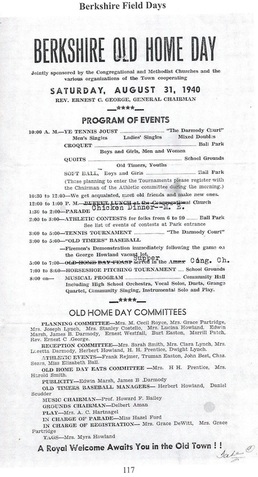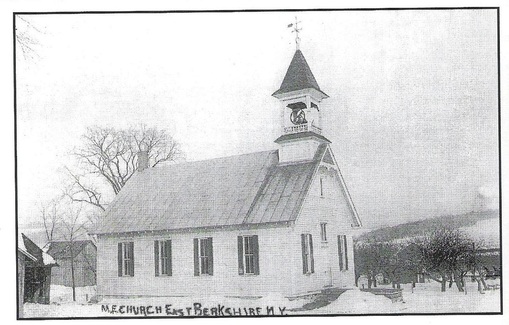Cultural Perspective
There are different cultures that exist all over the world. The big families that use to reside and/or still reside in Berkshire are what made the town thrive and gave it its character (Clark S., 2012). The settlers that moved to Berkshire from Stockbridge, Massachusetts brought with them jobs and agricultural ideas (Hunt & Stoughton, 2009). They learned how to live off the land and to make money selling things, like bonnets and other items (Hunt & Stoughton, 2009). There are also things that the people of Berkshire did, as a community, to bring everyone together. Berkshire had community gatherings that were put together by the committee and the churches, called the Old Home Days, which was usually held in August (Hunt & Stoughton, 2011). They did things like play croquet and had a softball game (Hunt & Stoughton, 2011). Usually they had a parade in the middle of this event and played music and ate dinner (Hunt & Stoughton, 2011). Some other things the town of Berkshire did, as a community, were to have town meetings and suppers at the Grange Hall, where they also had indoor horseshoe tournaments (Clark A., 2012). The community in Berkshire was all about working together, helping each other out, and to always have fun.
In comparing the religion of a Northern state to a Southern state, both Berkshire and Concord had a variety of churches. The churches in Berkshire consisted of a Methodist church, a Congregational church, East Berkshire church and a Baptist church (Hunt & Stoughton, 2009). The Berkshire people used their churches to practice religion only and used one-room buildings for to teach school in (Clark D., 2012). “We never prayed in school, we just said the Pledge of Allegiance”, “Prayers were only said in church and before a football game,” says Dave Clark (Clark D., 2012). Concord, on the other hand, had Baptist, Methodist, Lutheran, and Catholic churches (A bicentennail history, 1996). They even had an African-American church that was called Zion Chapel that was built in 1859 (A bicentennail history, 1996). Religion seems to play a much bigger role in Concord than in Berkshire. Yes, people went to church on Sundays but that was it; they never went to church on Wednesdays, like they do in Concord (Clark S., 2012).
In comparing culture, another cultural difference between Concord, North Carolina and Berkshire, New York, is that Concord had slavery/African-American workers and Berkshire didn’t (A bicentennail history, 1996). The population of Berkshire only consisted on white Americans, where Concord had a mix of white Americans and African-Americans (Clark S., 2012). Our accents are also different in which different words have different meanings. For example, “fixin’ to”, in the South, means that you’re about to go do something (Clark S., 2012). In the North, we say the word “fixing”, which means that we are repairing something or preparing something (Clark S., 2012). No matter what words we speak or what state we live in, there will always be differences because each place is part of a different culture (Clark S., 2012).
There will always be cultural differences between these two places because Berkshire is a small town and Concord is a city; Berkshire is part of a Northern state, Concord is part of a Southern state (Clark S., 2012). Both places use words/phrases that mean different things. You can see that culture plays a big role in the way that we do and say things (Clark S., 2012).
In comparing the religion of a Northern state to a Southern state, both Berkshire and Concord had a variety of churches. The churches in Berkshire consisted of a Methodist church, a Congregational church, East Berkshire church and a Baptist church (Hunt & Stoughton, 2009). The Berkshire people used their churches to practice religion only and used one-room buildings for to teach school in (Clark D., 2012). “We never prayed in school, we just said the Pledge of Allegiance”, “Prayers were only said in church and before a football game,” says Dave Clark (Clark D., 2012). Concord, on the other hand, had Baptist, Methodist, Lutheran, and Catholic churches (A bicentennail history, 1996). They even had an African-American church that was called Zion Chapel that was built in 1859 (A bicentennail history, 1996). Religion seems to play a much bigger role in Concord than in Berkshire. Yes, people went to church on Sundays but that was it; they never went to church on Wednesdays, like they do in Concord (Clark S., 2012).
In comparing culture, another cultural difference between Concord, North Carolina and Berkshire, New York, is that Concord had slavery/African-American workers and Berkshire didn’t (A bicentennail history, 1996). The population of Berkshire only consisted on white Americans, where Concord had a mix of white Americans and African-Americans (Clark S., 2012). Our accents are also different in which different words have different meanings. For example, “fixin’ to”, in the South, means that you’re about to go do something (Clark S., 2012). In the North, we say the word “fixing”, which means that we are repairing something or preparing something (Clark S., 2012). No matter what words we speak or what state we live in, there will always be differences because each place is part of a different culture (Clark S., 2012).
There will always be cultural differences between these two places because Berkshire is a small town and Concord is a city; Berkshire is part of a Northern state, Concord is part of a Southern state (Clark S., 2012). Both places use words/phrases that mean different things. You can see that culture plays a big role in the way that we do and say things (Clark S., 2012).
Berkshire Field Days

(Hunt, 2011)
This is a photo copy of an advertisement that was posted for people of Berkshire to see in an upcoming field days event. This community event was also an all day event that took place from 10 a.m. to sometime past 8:00 p.m.. The photo shows the different things that took place in the Berkshire Old Home Day in 1940.

